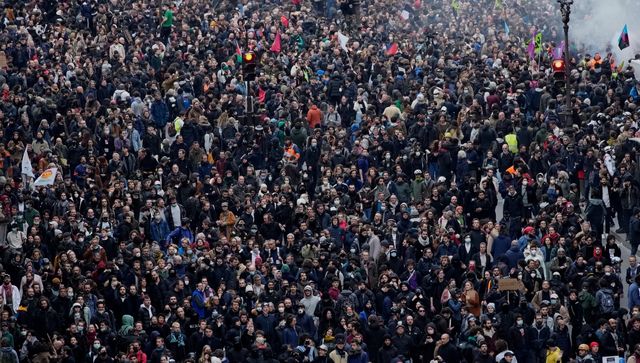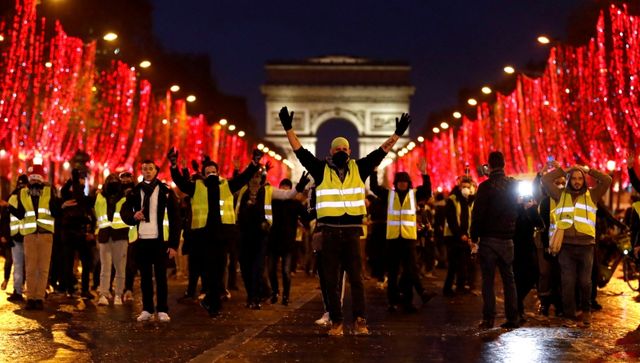Will France’s pension protests turn into another yellow vest movement?
Violence at Thursday’s nationwide protests against Emmanuel Macron's pension reforms in France evoked memories of the clashes that occurred during the 2018 yellow vest movement, which killed 11 and left thousands injured. Can the ongoing demonstrations become yet another uprising?

Millions protested across France on Thursday against the government's proposed pension reforms. AP
Angry demonstrators opposing the French government’s pension reforms hit the streets in large numbers on Thursday (23 March).
While unions say 3.5 million people participated in protests across the country, the authorities put the number at around 1.1 million.
Protests took a violent turn in some places, with unions calling for nationwide strikes and marches next Tuesday (26 March) – when British monarch King Charles III is scheduled to visit the Western European country.
France has been witnessing protests for months against President Emmanuel Macron’s plan to increase the retirement age from 62 to 64.
Let’s take a look at the protests and whether they are similar to the 2018 yellow vest movement.
Fire, teargas and walkouts
On Thursday evening, the heavy wooden door of the Bordeaux City Hall was ignited by members of an unauthorised demonstration, reported Sud Ouest newspaper. The blaze was quickly extinguished by firefighters.
As per France’s interior ministry, 1,19,000 people protested in Paris, while union leaders say 8,00,000 demonstrators – young, old, professional, unemployed – appeared for the mostly peaceful march in the capital, reported The Guardian.
A group of young people known as casseurs (smashers), dressed in black, smashed shop windows, attacked a McDonald’s restaurant and destroyed bus shelters and advertising hoardings in Paris, as per media reports.
Paris’ Place de l’Opéra and Place de la Bastille also reported violent clashes where police used tear gas to disperse protesters.
Violence also erupted in the cities of Nantes, Rennes and Lyon during the nationwide protests.

In Lorient town, the courtyard of a police station was set on fire and its windows were smashed, as per Associated Press (AP).
At least 80 people were arrested across the country, with 33 in Paris alone, reported BBC.
Around 123 police officers were injured in France, according to interior minister Gerald Darmanin.
French police claimed 1,000 people acted “violently”, starting fires, releasing smoke bombs and vandalising property, as per CNN.
Famed tourist attractions such as Eiffel Tower and the Versailles Palace were shut on Thursday due to the strikes.
Marseille, Besançon, Arles and other French towns and cities also saw large protests.
In the northern city of Rouen, witnesses said a young woman lost her thumb after a “flash-ball” grenade fired by police to disperse protesters hit her, reported BBC.
Teachers walked off the job, while strikes also disrupted train and air travel and affected oil refineries.
These were the ninth union-organised demonstrations since January.
ALSO READ: Why are streets in France littered with heaps of garbage?
Protesters vs French government
Women were among the most furious protesters as, they say, the retirement bill would hit them the most.
“Everyone is angry. Everyone thinks this law is unfair, but it particularly penalises women who are expected to produce future generations of the nation, and then find they are punished for doing so,” said Marie, a 46-year-old social worker, told The Guardian.
“I oppose this reform and I really oppose the fact that democracy no longer means anything,” a protester told Reuters. “We’re not being represented, and so we’re fed up.”
Speaking to The Guardian, Juliette, a 51-year-old teacher, asked: “They want to raise it to 64 today. Will it be 66, 67, 68 tomorrow? They tell us life expectancy is longer, but are we to work until we collapse and are carted off to the crematorium?”
The demonstrations came a day after Macron’s appearance on television.
Despite the protests and criticism, the French president has remained defensive about the pension reforms, saying they are needed to keep the system afloat.
He said on Wednesday that the protests were “legitimate” but would not result in the government withdrawing the law.
“It’s in the greater interest of the country. Between opinion polls and the national interest, I chose the national interest,” Macron said, as per CNN. Polls say most French are against increasing the retirement age, which would also lead to workers making contributions to the pension system for longer.
The French government is under fire for pushing the unpopular pension reforms through the lower house of parliament without a vote using a special constitutional measure last week.
Is this France’s new yellow vest movement?
Violence at largely peaceful protests against the pension reform bill is a reminder of France’s 2018 yellow vest protests that had emerged as the “biggest challenge” to Macron’s presidency.
The protests had started on 17 November 2018 against the Macron government’s planned hikes in diesel taxes as part of its environmental policy strategy.
Initially, the demonstrators were made up of motorists in rural and suburban areas who heavily rely on their cars to earn their living.
Donning fluorescent safety jackets or Gilets Jaunes, which are mandatory in French cars, protesters appeared across the country every Saturday to oppose the rise in fuel prices.
The protests soon expanded with small business owners, employees and care workers forming a majority of the movement against Macron’s alleged bias favouring the elite and well-off city dwellers.

“The picture that emerged was that of a movement made up largely of workers and former workers in a situation of financial insecurity, with relatively few unemployed,” Frédéric Gonthier, a political scientist, told France 24 in November 2019.
Jérôme Fourquet of the polling organisation Ifop had described the yellow vests in November 2018 as “people who are too rich to receive welfare benefits but not rich enough to live well. Not the poorest but just above that”, as per Radio France Internationale (RFI).
The movement was connected by dozens of Facebook pages, but was “largely shapeless, leaderless and with no clear ideological bent”, as per France 24.
Soon “far-left activists, anarchists and rioters” joined the movement, noted RFI.
The protests peaked in December 2018 when angry demonstrators stormed Arc de Triomphe in central Paris, the worst civil unrest seen in the country in 50 years.
The Arc de Triomphe was vandalised with graffiti. The yellow vests gathered at Champs Elysees, where the Arc de Triomphe is located, set fire to makeshift barricades, vehicles, and looted shops, with hundreds getting wounded in the clashes.
“We are in a state of insurrection, I’ve never seen anything like it,” Jeanne d’Hauteserre, mayor of Paris’s 8th district, had said at the time.
Roughly half the yellow vest protesters were women. Oriane, a social worker in her 20s, who set up the first women’s yellow vest page on Facebook along with her friend, told France 24 in 2019: “Women are the first victims of poverty and this is why I’m a woman Yellow Vest”.
She said she was protesting due to “the government’s unfair policies and Macron’s contempt for small folk like us”.
The government eventually decided to backtrack on its initial proposed hike. The protests which saw large gatherings earlier started to peter out in 2019.
Over 8,000 people were arrested, at least 11 killed and thousands were injured at the protests that lasted for 60 consecutive weeks, as per Anadolu Agency.
The clashes between the police and some protesters during the ongoing pension reforms have brought back memories of the yellow vest movement.
“It is too early to say whether there are similarities with the ‘yellow vests’ movement or the Nuit Debout movement [unleashed against the 2016 labor law]. All of this remains very uncertain and no one can say what it may lead to,” a government source told World Crunch.
With inputs from agencies
Read all the Latest News, Trending News, Cricket News, Bollywood News,
India News and Entertainment News here. Follow us on Facebook, Twitter and Instagram.
also read

Last-gasp strikes seek to prevent highly contested French pension reform
The last day of protests on Saturday saw a far lower turnout than in the previous rounds, while strikes from railway, refinery and public sector workers last week did not paralyse the country in the way that unions had hoped

French Senate approves pensions reform as protests appear to lose steam
Senators passed the reforms by 195 votes to 112, bringing the package another step closer to becoming law

French government fights to survive 2 no-confidence motions
National Assembly lawmakers are set to vote in the afternoon on two no-confidence motions, one from the far-right National Rally and the other, more threatening one from a small group that has gathered support across the left.
